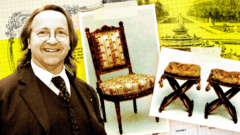The conviction of Georges "Bill" Pallot and Bruno Desnoues marks the conclusion of a lengthy investigation into art forgery, while another defendant was acquitted of wrongdoings in this high-profile case that exposed vulnerabilities in the antiques market.
French Antiques Experts Convicted in Royal Chair Fraud Case

French Antiques Experts Convicted in Royal Chair Fraud Case
Two prominent French antiques scholars face jail time for forging historic furniture once purportedly owned by royalty, including Marie Antoinette.
Two esteemed French antique scholars, Georges "Bill" Pallot and Bruno Desnoues, have been sentenced to prison for their involvement in a fraudulent scheme involving counterfeit 18th Century chairs, believed to have once belonged to historic figures like Marie Antoinette. The pair received four-month jail terms paired with longer suspended sentences, following their sales of these forged items to collectors, including the Palace of Versailles and a member of the Qatari royal family. Since both had already spent four months in pre-trial detention, they will not be returning to jail.
However, another suspect in the case, Laurent Kraemer, along with his gallery, was acquitted of charges related to gross negligence in verifying the authenticity of the chairs. The court’s decision followed a nine-year investigation that has caused considerable turmoil within France’s antiques industry. At a court in Pontoise, the judge also imposed significant fines on Pallot and Desnoues amounting to €200,000 (£169,500) and €100,000, respectively. Pallot described the financial penalties as "a little harsh," expressing relief that his Paris residence would not be confiscated.
Throughout the trial, prosecutors indicated that Kraemer and his gallery had failed to adequately authenticate the chairs before selling them, including pieces purchased by Qatari prince Mohammed bin Hamad Al Thani for €2 million. However, they maintained their innocence, asserting that they were unaware of the forgeries. Their attorneys expressed satisfaction with the ruling, which they claimed vindicated their clients after nearly ten years of allegations.
Pallot, once a revered authority on French 18th Century furniture and a lecturer at the Sorbonne University, had access to critical historical records from the Palace of Versailles. He leveraged this knowledge to create replicas of chairs that were not accounted for in palace inventories. Desnoues, an accomplished woodworker, was instrumental in crafting the forgeries. Pallot, reflecting on the court hearings, candidly remarked, "Everything was fake but the money."
Prosecutor Pascal Rayer highlighted that this case has exposed inherent flaws in the antiques market, underscoring potential conflicts of interest, especially when experts moonlight as merchants without disclosing their dual roles. Rayer emphasized the necessity for more stringent regulations within the art marketplace to ensure fairness and transparency in transactions. This case comes amidst various scandals within France's antiques dealings, including that of the late Jean Lupu, also accused of selling counterfeit royal furniture before his death in 2023.




















